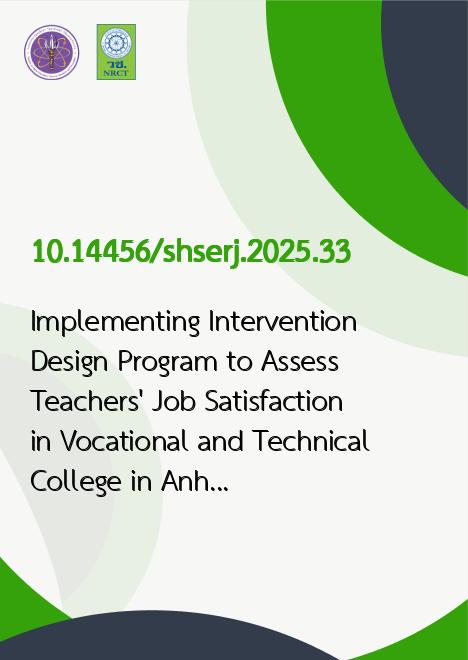
|
Implementing Intervention Design Program to Assess Teachers' Job Satisfaction in Vocational and Technical College in Anhui, China |
|---|---|
| รหัสดีโอไอ | |
| Creator | Zhiping He |
| Title | Implementing Intervention Design Program to Assess Teachers' Job Satisfaction in Vocational and Technical College in Anhui, China |
| Publisher | Assumption University Press |
| Publication Year | 2568 |
| Journal Title | The Scholar: Human Sciences |
| Journal Vol. | 17 |
| Journal No. | 2 |
| Page no. | 21-33 |
| Keyword | Job Satisfaction, Career Development, Employee Engagement, Talent Management, Work Environment |
| URL Website | https://assumptionjournal.au.edu/index.php/Scholar/article/view/7986 |
| Website title | https://assumptionjournal.au.edu/index.php/Scholar |
| ISSN | 2586-9388 |
| Abstract | Purpose: This study explores the factors influencing teachers' job satisfaction at the Anhui Institute of Vocational Technology. By investigating the relationship between five key variables and teachers' job satisfaction, it seeks to provide comprehensive theoretical insights and practical guidance for educational institutions. Research Design, Data, and Methods: A questionnaire survey was conducted among 100 teachers at the Anhui Institute of Vocational Technology. The research employed the Index of Item-Objective Congruence (IOC) to evaluate validity and conducted a pilot test (n=50) to assess reliability using Cronbach's Alpha. Following this, a group of 30 teachers engaged in a 15-week Intervention Design Implementation (IDI). Subsequently, the quantitative data collected from pre-IDI and post-IDI evaluations underwent paired-sample t-test analysis for comparison. Results: The study found significant correlations between career development, employee engagement, emotional stability, talent management, work environment, and teachers' job satisfaction. Specifically, career development opportunities, employee involvement in decision-making, emotional stability, effective talent nurturing, and a positive work environment were key drivers of increased job satisfaction among teachers. Conclusion: Recommendations include formulating robust career development frameworks, fostering greater employee participation, prioritizing teachers' emotional well-being, optimizing talent management protocols, and improving working conditions. Addressing these factors holistically can create an environment conducive to increased teacher satisfaction, thus fostering comprehensive school development. |
